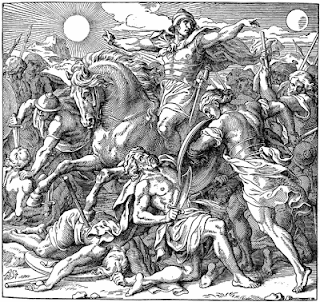Dr Bob Thiel really seems to like the Prophet Amos. The reason seems clear. Amos was just your average guy sheepherder. He did not go to the school of the prophets. He wasn't trained in it. He just are one evidently. Some think he spent too much time herding his sheep with nothing much else to do those lonely days and nights. Maybe he had a dream or got doubly blessed somehow and ...Viola! I am a prophet! I can see why Bob likes that tale.
(For my own general view and examples of mental illness in the Biblical Characters see:
https://ezinearticles.com/?Prophets,-Apostles,-and-Mental-Illness&id=90708)
Amos is also used by those who study the psychology or lack thereof of the Biblical characters. Some seem very depressed such as Jeremiah. Some almost defy description with their schizophrenia such as an Ezekiel. All hear the voice of God in their heads. Few seem to act on their own volition. And all were not as conscious in their thinking as we are today.
The theory of the just how conscious human beings were up until three thousand years ago when writing came into the picture is a fascinating study. I personally found Julian Jaynes perspective on Consciousness and the Bi Cameral Mind telling and explained a lot that I had always noticed in the personalities or lack thereof in the OT prophets and characters. They seemed like robots.
The basic premise is that the personal "I" was not present in the recent past. Humans were more robotic and obeyed the voice of the gods in their heads more than thinking it through themselves. You see this plainly in the Old Testament. And if you know the text well enough, you will see that those who were the bad boys of the OT were the more conscious ones and the less conscious types punished them for stepping out of line. The less conscious who just robotically repeated "Thus saith the Lord...", were inevitably the priest craft. As God evolves from walking in the Garden with Adam and Eve to the cry of "Why art thou so afar off...?" , Jaynes does a magnificent job of showing how humans woke up and lost that voice of the gods only in their heads. Today in religion the fix is to "just have faith. Trust and obey for there no other way to be happy in Jesus, but to trust and obey"
So how did Amos think? Was he as conscious a human as we are today? No he wasn't. He simply was a conduit for the voices in his head he ascribed to God. He belonged to what is called the Axial Age. He was slow to adopt ,or never did or could, the changes that were coming to human consciousness
From Psychology Today...
"According to many scholars of the era, before about 550 BCE, human personality was different than it is now. The conscious, aware, self was simply a different and more limited entity. It was not until the Axial Age that reflective self-awareness, reflective consciousness, and a modern sense of identity emerged.
Three differences in particular separated the pre-Axial from contemporary personality.
The first difference was in how people perceived their thoughts. Pre-Axial peoples often attributed their ideas and motives as coming from outside themselves, from other people, from nature, or emanating from Gods. (Ahem...Bob)
Secondly, Pre-Axial peoples were almost exclusively aware of the outside world of the land, people, things, and the gods they perceived around them. They tended to ignore their inner ideas and feelings almost entirely. Their psychological thought processes remained mostly unexplored territory. One exception: under some life-threatening circumstances, their attention could be captured by extreme feelings of fear and terror. (Ahem....)
Third, for a pre-Axial person, identity was limited to one's name, parentage, occupation, and personal life history. By contrast, for most of us today, our identities include also a sense of our thoughts, beliefs, goals, and moral characteristics.
Many pre-Axial written works (e.g., before about 550 BCE) though richly detailed, lack introspective, reflective words, descriptions or accounts. (See here for evidence beyond the literature of the time).
An example of a pre-Axial personality depicted in the Hebrew Bible is of Amos. The Hebrew Bible is a collection of books, some multiply-authored, and others authored mostly by a single individual. These books began to be assembled into what is known today as the Hebrew Bible around 600 BCE.
One of the earliest singly-authored book is that of Amos, which may have been written in 800 BCE (and transmitted orally before that). Amos is one of the 12 minor prophets.
Consistent with ideas of the pre-Axial identity, Amos possesses a name, occupation, and a sketch of a life history, but little more. A brief introduction to the book states simply:
The words of Amos, a sheepbreeder from Tekoa, who prophesied concerning Israel in the reigns of Kings Uzziah of Judah and Jeroboam son of Joash of Israel, two years before the earthquake.
The book continues regarding Amos, that "He [Amos] proclaimed:"
The Lord roars from Zion,
Shouts aloud from Jerusalem;
And the pastures of the shepherds shall languish,
And the summit of Carmel shall wither.
Thus said the Lord:
For three transgressions of Damascus,
For four, I will not revoke it,
Because they threshed Gilead
With threshing boards of iron,
I will send down fire upon the palace of Hazael...
The book of Amos begins, in other words, with Amos' repetition of what he believes to be the Lord's words to him, without alteration. The psychology of this is clarified in Chapter 3, when Amos pauses from his recitation with the following commentary:
Can misfortune come to a town
If the Lord has not caused it?
Indeed, my Lord God does nothing
Without having revealed His purpose
To His servants the prophets.
A lion has roared
Who can but fear?
My Lord God has spoken,
Who can but prophesy?
Amos then continues to further describe transgressions and the consequent punishments by God, each verse concluding with "...declares the Lord."
In Chapter 7, Amos recounts that he had a conversation with God, asking God to restrain several of his most severe punishments so that Israel might survive, and that God relented. In the same chapter, Amos describes how the priest of Bethel advised him to leave the area as he was stirring up trouble. Amos replies, basically, that he is not in control; God is:
"I am not a prophet, and I am not a prophet's disciple. I am a cattle breeder and tender of sycamore figs. But the Lord took me away from following the flock, and the Lord said to me, ‘Go, prophesy to My people Israel...'" (Or maybe "I got doubly blessed?)
From one perspective, Amos exhibits the many qualities of pre-Axial human beings. When he hears voices he obeys. He responds with little or no internal awareness, and he possesses little or no identity beyond a name, life history, and occupation.
This conception of the pre-Axial mind could all be wrong, of course. The Bible's redactors might simply have focused on the prophesies, omitting anything further about Amos and his character as irrelevant. Alternatively, Amos may have been fully aware, but have lacked words to describe his awareness.
A religious interpretation is also possible, of course (one that takes us outside science today): that God was directing Amos and that Amos, although aware and conscious, is simply reporting what occurred.
Yet Amos' apparent lack of awareness is similar to the descriptions others of the pre-Axial period have provided of their own and others' acts."
For the continuation of the concept the follow up article can be found here:
https://www.psychologytoday.com/us/blog/the-personality-analyst/200906/personality-the-axial-age




















